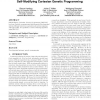746 search results - page 4 / 150 » Short Term Unit-Commitment Using Genetic Algorithms |
106
click to vote
ADVAI
2010
14 years 8 months ago
2010
The focus of warfare has shifted from the Industrial Age to the Information Age, as encapsulated by the term Network Enabled Capability. This emphasises information sharing, comma...
127
click to vote
GECCO
2008
Springer
15 years 3 months ago
2008
Springer
We are interested in engineering smart machines that enable backtracking of emergent behaviors. Our SSNNS simulator consists of hand-picked tools to explore spiking neural network...
120
click to vote
GECCO
2009
Springer
15 years 6 months ago
2009
Springer
Self-Modifying Cartesian Genetic Programming (SMCGP) is a form of genetic programming that integrates developmental (self-modifying) features as a genotype-phenotype mapping. This...
126
click to vote
IJCAI
1989
15 years 3 months ago
1989
Multilayered feedforward neural networks possess a number of properties which make them particularly suited to complex pattern classification problems. However, their application ...
101
click to vote
WSC
2007
15 years 4 months ago
2007
In this paper we introduce the completed unit algorithm (CU-AL), a probabilistic scheduling methodology for repetitive projects. The algorithm has two main advantages, simplicity ...

